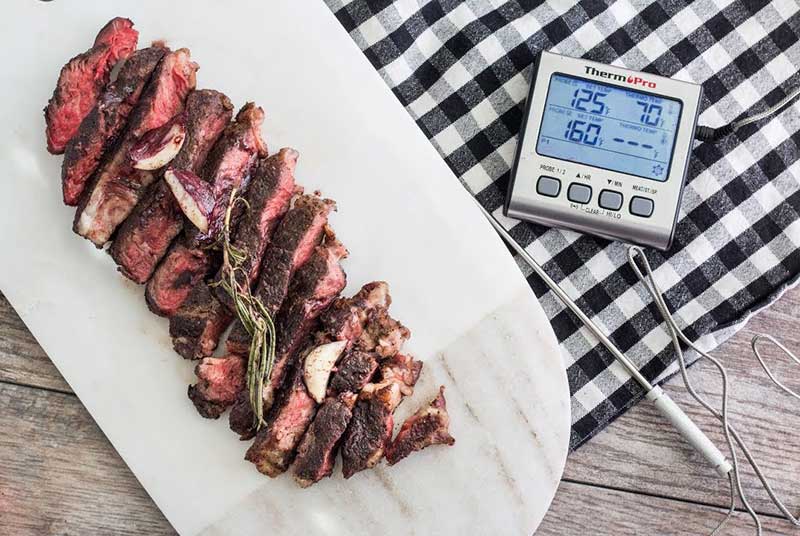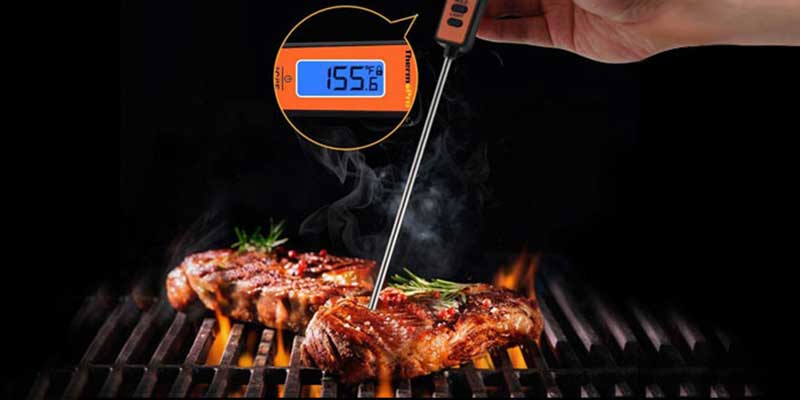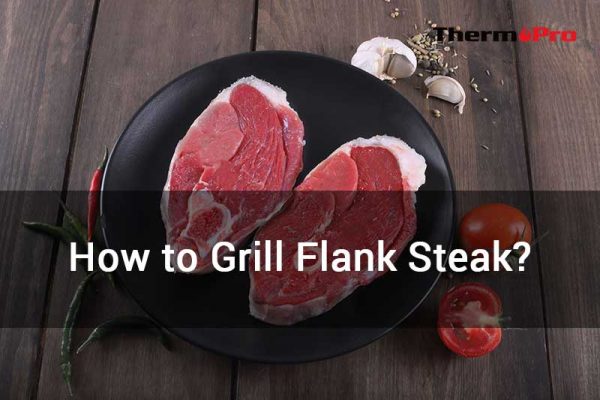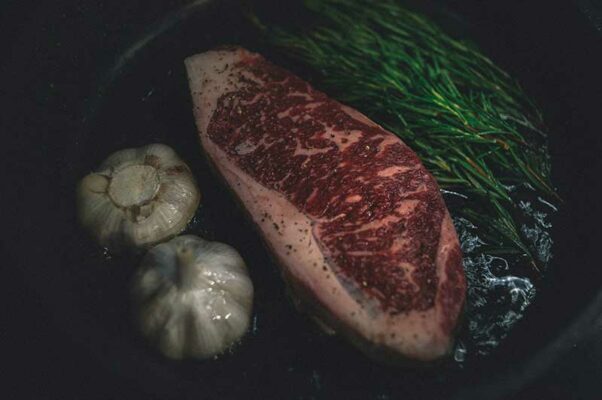The customer service team is always listening, taking notes, and quantifying complaints to ensure our products are continually improved. Due to selling directly to you, the customer, via Amazon, we can use product reviews to help us improve our existing products or help further development of new products.
How to Cook Ribeye Steak on the Grill
Table of Contents
Summertime signals the lazy, hazy days of outdoor cooking. There’s nothing better than the rich, hearty taste of a juicy steak cooked on the grill. But to perfectly grill ribeye steak, you’ve got to use the right technique, the right timing, the right temperature, and the right tools.
In addition to a good charcoal or gas grill, metal barbecue tongs, and seasonings, you will want to include a ThermoPro Meat Thermometer in your grilling arsenal. You’ll get a juicy, perfectly cooked steak every time! The ThermoPro is an indispensable tool for ensuring your grilling ribeye steak is the done just the way you like it.
So what’s the secret? The key to getting the best grill ribeye steak is gauging the grill ribeye steak temperature. This article below shares tips to make restaurant-quality steak in your own backyard or kitchen. So let’s get started. Shop for your best cut of meat (prime, choice, or select), pull out the grill, and read the following tips:
How to Cook Ribeye Steak on the Grill?
It’s as easy as one, two, three! Start with a choice cut of ribeye steak at 1.25 to 1.5 inches thick, well marbled with fat. The higher fat content insures a juicier, more tender cut.
Take your steak out of the fridge and let the meat come to room temperature for about 30 minutes so that the interior raw temperature is not cold. You definitely don’t want to grill a frozen steak as the meat will be waterlogged, cooked unevenly, and almost impossible to get a good sear without being tough.
Gather your grilling tools, set up the grill, and prepare to be crowned “King of the Backyard Barbecue!” Once you master how to cook ribeye steak on the grill, you’ll be swarmed by hungry family and friends.
Trim and Season the Meat Well
Trim excess fat and season with sea salt and cracked black pepper. You can also make a dry rub with seasoned salt, fragrant herbs, or ground peppercorns. Pat the steak on both sides with a generous amount of seasonings. Some cooks like to marinate their steaks overnight to let seasonings permeate the meat.
While a marinade enhances the taste of grilled meat, you don’t want to be careful not to overpower your ribeye with seasonings. A good, well-marbled ribeye steak is naturally packed full of flavor and you want that flavor to be the star of the dish and shine!
Clean and PreHeat the Grill
On the day of the barbecue, prep your work area and assemble your tools. Your ThermoPro meat thermometer will ensure your ribeye gets some TLC throughout the cooking process. Meanwhile, prepare your gas or charcoal grill by cleaning the grill surface and rubbing the grate down with a small amount of cooking oil on a soft cloth to reduce sticking. Preheat the gas grill so that your grill ribeye steak temperature stays consistent.
If you’re using a charcoal grill, you want to start the fire and let the coals burn for 30 minutes or so to prevent the steaks from smelling like charcoal lighter fluid. White hot coals ensure a more even flame without flareups.
Cooking with Gas
If you like the taste of food cooked with gas, make sure to set grill ribeye gas grill temperature at 350 to 400 degrees Fahrenheit. The advantage of cooking with gas is that it’s easy to clean up afterwards and easy to regulate the temperature. You won’t get flareups and uneven temperature zones common with charcoal fires.
Cooking with Charcoal
If you want to enjoy grill ribeye charcoal style, you will have greater success if you divide your grill into two sections—one for high temps and the other for lower degrees of heat. Create a higher temperature zone by piling more coals in one area—half the grill.
The low temperature zone will have fewer coals and is used to keep steaks warm or cook your ribeye to a rare or medium rare doneness. Your ThermoPro Meat Thermometer will ensure that your steak is cooked to perfection!
How Long to Cook Ribeye Steak on the Grill?
If you’re using a charcoal grill, make sure the coals are evenly distributed on the grill bed and white hot. Depending on the degree of doneness, you will leave your steak on the grill longer. Use your handy ThermoPro Meat Thermometer to test the grill ribeye steak temperature as the meat cooks.

If you like your steak rare, an internal temperature of 120 degrees Fahrenheit is perfect. For medium rare, the thermometer should register 130 degrees. Medium temps should be 140 degrees and well-done ribeye steaks register 160 degrees Fahrenheit when perfectly cooked.
Tips for Grilling Ribeye Steak
Cook on High Heat
Whether you use a charcoal or gas grill, the best grill ribeye steak is prepared on high heat. The more intense heat sears the outside of the meat, leaving the interior juicy and full of flavor. The sear traps in moisture while creating a flavorful crust most steak lovers crave.
Cook over high heat for four to six minutes on each side, depending on your desired degree of doneness. Test the internal temperature ocasionally using your ThermoPro meat thermometer.
Create Great Grill Marks
We eat first with our eyes, so make sure to get those grill marks. To get great diagonal grill marks, place your steak at a 45-degree angle. Try not to turn your ribeye steaks more than once. Get a good sear and grill marks on one side, then turn the steak to finish cooking on the other side, searing well. To finish your mouth-watering, gourmet-quality ribeyes, you can baste the tops with a dollop of creamy butter to add moisture, richness, and a burst of flavor.
To Prevent Overcooking Rely On Your ThermoPro Meat Thermometer
To avoid overcooking and drying out your grill ribeye steaks, test for doneness. Insert your ThermoPro meat thermometer at the thickest part of the cut, near the center. The internal temperature of the meat will cause the gauge on your thermometer to gradually rise.

Since the meat continues to cook even when it is removed from a hot grill to rest, you can remove the thermometer a few degrees shy of its ideal temperature. Take the steaks off the grill and . . .
Give It a Rest
Let your steaks rest for five minutes on a metal rack over a serving platter so the juices don’t collect in the plate but stay inside the meat for the juiciest, most tender ribeye you’ve ever tasted.
To preserve all that juicy goodness, be sure not to cut into the steak until it’s rested or you risk having juices run out of the meat leaving it dry and inedible.
More Ways to Cook a Ribeye Steak
When the weather is not ideal, you can still cook a ribeye to perfection on your stove top or in the oven. The best way to do steak on a stove top is in a cast iron skillet. There’s something about rustic cast iron that lends extra flavor to meat. Pour a small amount of cooking oil in the skillet on high heat. The oil should smoke slightly. Place a seasoned piece of steak in the skillet and let it sizzle on one side until a crust is formed. Don’t touch it! After four to five minutes, turn the steak and place it raw side down in the skillet.
If you want a rare steak, test for doneness with your ThermoPro Meat Thermometer until the right temperature is reached. Once both sides of your ribeye are done, you can add some extra flavor. Garnish the top of the steak with a big pat of butter for rich goodness and remove it to a warming platter to rest. Some cooks prefer to flash cook the steak on both sides, then transfer to the oven in the same skillet, and cook at 400 degrees until the internal temperature is reached. The ThermoPro Meat Thermometer can also be inserted to test for doneness.
Why Not Order Your ThermoPro Today?
Now that you’ve reviewed these tips on grill ribeye steak and how using a ThermoPro meat thermometer can ensure the juiciest meats, you’ll want to order one right away. You can use your ThermoPro meat thermometer for outdoor grilling, preparing holiday fare in a standard or convection oven, or cooking all year round.
You won’t have to worry about overcooked turkey, ham, pork and beef roasts, or ribeye steaks when you have an indispensable, handy tool like the ThermoPro meat thermometer. You will be amazed at how easy cooking outdoors can be. Order yours today.









